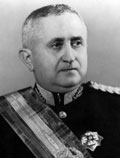 |
Eurico Gaspar Dutra
b. 18 May 1883, Cuiabá, Mato Grosso [1]
d. 11 Jun 1974, Rio de Janeiro |
| Title: |
Presidente da República (President of the Republic) |
| Term: |
31 Jan 1946 - 31 Jan 1951 |
| Chronology: |
28 Jan 1946, election to the office of President of the Republic is declared upon counting popular votes (cast 2 Dec 1945), decision of the Tribunal Superior Eleitoral (Superior Electoral Court) of 28 Jan 1946 |
| |
31 Jan 1946, took an oath of office, session of the Superior Electoral Court, Tiradentes Palace, Rio de Janeiro [handover ceremony in the Catete Palace] |
| |
31 Jan 1951,
expiration of term |
| Biography: |
| Eurico Gaspar Dutra entered the Praia Vermelha military school in Rio de Janeiro (1904), but was soon expelled for his involvement in the Vaccine Revolt. Amnestied Dutra was again admitted to the school in November 1905 and later studied in Porto Alegre receiving his first promotion as second lieutenant in April 1910. Repudiating the mistakes of his youth, Dutra was a loyal commander under the federal government and distinguished himself suppressing the tenente revolts (1922, 1924). Dutra kept loyalty to Washington Luís, who was ousted by the military (1930), but he won recognition of the Vargas government as he crushed a constitutionalist revolt in São Paulo (1932). Promoted to general (4 Oct 1932), Dutra was appointed director of the Air Force (1933) and served as war minister in the cabinet of Getúlio Vargas (5 Dec 1936 - 3 Aug 1945). The crisis of the Estado Novo and subsequent deposition of Vargas (29/30 Oct 1945) helped form an alliance of Dutra with the Social Democratic Party (Partido Social Democratico), which supported the general at presidential elections of 2 Dec 1945. Elected by a wide margin of votes, Dutra worked for returning Brazil to normal conditions and democracy following World War II and the Vargas dictatorship. He called a Constituent Assembly, which wrote a new constitution, promulgated on 18 Sep 1946. The government reacted sternly to rising popularity of Communists in the post-war Brazil and outlawed the party. The Congress supported this campaign and enacted a law canceling the right of Communists to hold elective offices. Brazil broke relations with the Soviet Union (1947) and tightened the bonds of friendship with the United States. Dutra's economic program included cutting government expenses, limiting bank loans, and controlling prices. Brazil was able to witness considerable control in inflation and almost liquidated the large debt it owed United States companies. Dutra presided over the transition of power to Vargas, who won the general election on 3 Oct 1950. Dutra retained his influence in political affairs. He discreetly supported the military, who sought the resignation of Vargas in 1954. With the establishment of the military regime, he was a candidate for the presidency (1964) and held a seat on the board of the government-sponsored National Renewal Alliance (Aliança Renovadora Nacional [Arena]). [2] |
| Elections: |
| Candidate (party) |
Popular vote (2 Dec 1945) [3] |
| Eurico Gaspar Dutra (Social Democratic) |
3,251,507 |
| Eduardo Gomes (National Democratic) |
2,039,341 |
| Iedo Fiúza (Communist) |
569,818 |
| Mário Rolim Teles (Agrarian) |
10,001 |
|
| |
| [1] |
Being of somewhat weak constitution in his teen years, Dutra failed the physical for enrollment in the army; so his father arranged to have his birth year recorded as 1885 to approximate Eurico's physical condition to his re-computed age. He failed again. It did not keep Dutra from eventually becoming a general, and 1885 remained his "official" birth year. [2, p. 1126]. |
| [2] |
Dicionário Histórico-Biográfico Brasileiro (1984) |
| [3] |
Dicionário do voto (2000) |
| |
Image: official photograph of Eurico Gaspar Dutra (Centro de Pesquisa Documentação/FGV/Arquivo Geraldo Rocha /GR foto 006). |